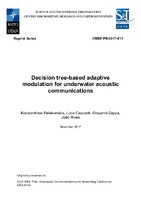| dc.contributor.author | Pelekanakis, Konstantinos | |
| dc.contributor.author | Cazzanti, Luca | |
| dc.contributor.author | Zappa, Giovanni | |
| dc.contributor.author | Alves, João | |
| dc.date.accessioned | 2018-10-11T14:09:55Z | |
| dc.date.available | 2018-10-11T14:09:55Z | |
| dc.date.issued | 2017/11 | |
| dc.identifier | 100620 | |
| dc.identifier.govdoc | CMRE-PR-2017-011 | |
| dc.identifier.uri | http://hdl.handle.net/20.500.12489/702 | |
| dc.description.abstract | Underwater acoustic channels are characterised by non-stationary fading statistics and consequently, a modulation scheme optimally designed for a specific fading model will underperform when the channel statistics change. This issue can be alleviated by using adaptive modulation, i.e., the matching of the modulation scheme to the conditions of the acoustic link. However, selecting signals from a broad range of bit rates is tedious because one needs to know the relationship between the bit error rate (BER) and all relevant channel characteristics (e.g., multipath spread, Doppler spread and signal-to-noise ratio). In this work, this relationship is extracted from large amounts of transmissions of a phase-shift keying (PSK) single-carrier modem. In particular, a decision tree is trained to associate channels with modulation schemes under a target BER. The effectiveness of the proposed tree method is demonstrated by post-processing data from two experimental links off the coast of Faial Island, Azores, Portugal. | |
| dc.format | 5 p. : ill. ; digital, PDF file | |
| dc.language | English | |
| dc.publisher | CMRE | |
| dc.source | In: 2016 IEEE Third Underwater Communications and Networking Conference (UComms) | |
| dc.subject | Underwater communications | |
| dc.subject | Acoustic communications | |
| dc.subject | Modulation (Electronics) | |
| dc.title | Decision tree-based adaptive modulation for underwater acoustic communications | |
| dc.type | Reprint (PR) | |
| dc.type | Papers and Articles | |
